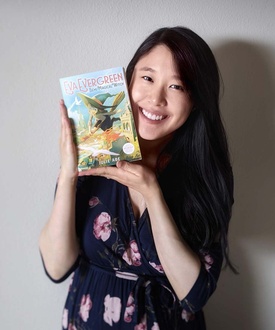I didn’t know who I was truly writing for until my father read my book.
I had just received advanced copies of my debut children’s book - Eva Evergreen, Semi-Magical Witch - a middle grade fantasy novel about a twelve-year-old girl, Eva. She’s got just a pinch of magic, but she’s determined to pass her witch’s test—because if she fails, she’ll lose her magic forever.
When my father asked to read it, I was certain he wouldn’t like it.
After all, what would my father find of interest in a story about a little witch going on a quest? He watches football, loves martial arts and has plenty of black belts… Eva is sweet and charming, and would never roundhouse a fly.
Still, I gave him a copy, nervous about what he might think. Surely he wouldn’t be interested in a story like mine.
After all, Eva Evergreen—categorized as “middle grade” and placed in the children’s section of a bookstore—is “meant” for eight to twelve year olds.
But—the next time I saw him—the next day, he said, “I’ve almost finished, and—”
And—would he say it was too whimsical?
That he never read children’s books?
Or that I had a great imagination, but he usually didn’t read fantasy?
Instead, he laughed and said, with a touch of surprise in his voice, “There’s yuzu! You mentioned Tsudanuma!”
My fears were washed away and, instead, replaced with a sense of wonder.
Yuzu—a Japanese citrus, one of my favorite fruits. My go-to flavor for desserts in Eva Evergreen. Tsudanuma—one of my favorite cities in Japan, a quick train ride from my grandparents’ house. He knew I’d spend the whole day there if I could, just walking through the streets and drinking in the everyday sights and sounds; a comforting balm whenever I returned to Japan.
I grinned back at him. He understood. Yet, somehow, I still marveled at this, but couldn’t figure out why until later.
Over time, I realized that his surprise came from the way characters like me or him are shown in books. Either all Japanese or the side character in someone else’s story.
It is, I think, unusual for Japanese Americans to see themselves in literature with joy. Not the Japanese part—Haruki Murakami and many others write mesmerizing stories. But the whole: Japanese American.
I remembered the books I loved when I was younger. True, I found powerful, wonderfully written books about Japanese-American kids in WWII internment camps, but that was my grandparents’ story, not mine. There never were fantasy stories with characters with dark hair and dark eyes like me. It wasn’t a girl like me, just finding her way through a fantasy world. I’m so grateful for my gorgeous cover that features my main character, Eva, so prominently—with dark hair, dark eyes, and tanned skin like me—and it’s the kind of cover I would have been thrilled to see as a child.
This was the book I’d always wanted to write. And these are the readers I aim to reach. The readers who feel like they had their feet in two different continents, or who are never all one thing or another.
I had always felt "semi"—not all one thing or another, and oftentimes never "enough".
But now…
Now I know who I write for.
I write for myself, for my father, for readers like me. Who have always been never one thing or another. When I’m in the US, I’m considered only “part” American because of my Japanese heritage. In Japan, I’m “not really” Japanese because—even though I was born there—I’ve mostly grown up in the US.
But being “semi”? It’s perfect. It means you don’t have just one realm of culture you can relate to, but two. I want readers to remember that they are wonderful as they are. That who they are, what they are, it’s wonderful.
I write for the young Julie who thought the main character always had to have blonde or brunette hair to be worthy of a story.
I write for my father, who knows Tsudanuma without having to Google search.
I write for the readers who don’t know about yuzu, but want to learn more about a new culture.
I write for the Japanese-American readers who have never seen their two worlds come together in a story like this before.
I write for the readers who think they are too “semi”, not enough one thing or another. Readers, all those little parts and pieces make up you, the unique you that you are. And I hope you’ll always grow and change, but also accept every little part.
You, reader, are worthy as you are, and I hope you’ll remember that you’re the main character of your story.
© 2020 Julie Abe



